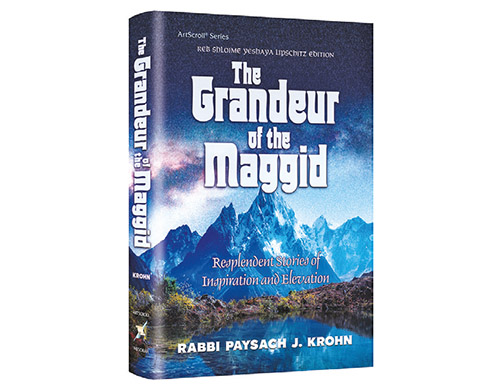
Highlighting: “The Grandeur of the Maggid: Resplendent Stories of Inspiration and Elevation” by Rabbi Paysach Krohn. Mesorah Publications Ltd. 2022. Hardcover. 300 pages. ISBN-13: 978-1422632628.
(Courtesy of Artscroll) Did you know that you can sometimes find angels (well, human angels) in a beachfront restaurant?
Would you believe that from the ruins of the building in Surfside could come an unbelievable story of kavod haTorah?
Have you ever really understood the remarkable miracle of Danish Jewry’s escape from the Nazis?
In “The Grandeur of the Maggid,” Rabbi Paysach Krohn’s tenth collection of inspiring stories, the “American Maggid” outdoes himself, bringing us true stories that elevate as they entertain, that illuminate as they inspire. He finds the grandeur in the lives of ordinary Jews—because he knows there is no such thing as an “ordinary” Jew. And, of course, he finds the grandeur in the lives and deeds of our Torah and communal leaders, with absorbing biographical sketches of Rav Chaim Kanievsky, Rav Yechiel Yaakov Weinberg, Rav Nota Greenblatt, and Rav Moshe Neuman zeicher tzaddikim livrocha.
Describing his mentor, Rav Sholom Schwadron—the famed and beloved “Maggid of Jerusalem”—Rabbi Krohn says: “He could make people cry and make them laugh, but more than anything else, he made them listen. And afterward, people would walk away saying, ‘He was talking to me.’”
That was true then, in the holy, winding streets of Yerushalayim. And it is true now as well, in our lives, as “The American Maggid” makes us cry and laugh—and as he talks to our very souls.
The following are two anecdotes from the brand new book.
Penciled In
Rabbi Alexander (Sender) Gross was a musmach of Rav Shlomo Heiman (1892-1945), Rosh Yeshivah of Mesivta Torah Vodaath and a very close talmid of Rav Shraga Feivel Mendlowitz (1886-1948). In 1947, he founded the Hebrew Academy of Miami, the first Jewish day school south of Baltimore. The Academy, which started with six students, today has more than 600. Since its inception, thousands of children have gone through its portals, where Rabbi Gross, during his thirty-two years as principal, gained his reputation as a master and caring mechanech.
The early years were difficult, as few parents in South Florida saw the need for an Orthodox education for their children. Additionally, many could not afford to pay the school’s tuition, even though Rabbi Gross offered liberal scholarships.
In 1959, the board of directors gave Rabbi Gross an ultimatum: The child of any parent not paying tuition must be removed from the Academy. The school was strapped financially. One particular family that felt school fees were too high told their nine-year-old son that he would soon be leaving the school permanently.
The child was crestfallen. He loved the Academy, especially the Jewish studies. He sat down and wrote Rabbi Gross a letter. He said, “I want to remain in your school. If you let me stay, maybe one day I will be a great rabbi, but if I have to leave, who knows what will become of me?”
Rabbi Gross was so touched by the letter that he read it to the board of directors at their next meeting. They decided to let the child continue at the Academy. He stayed until his eighth-grade graduation and was the class valedictorian. He continued his studies in the Telshe Yeshiva in Cleveland and became a prodigious talmid chacham.
The nine-year-old boy who wrote the letter was Zev (Billy) Leff. Rav Mordechai Gifter (1915-2001), the Rosh Yeshivah of Telz, once told Rabbi Gross, “If the Hebrew Academy was created just so that it could produce this one talmid, Rabbi Zev Leff, dayeinu—it would have been worthwhile.”
Rabbi Leff, a world-renowned speaker and spiritual leader, has authored numerous sefarim and led the Young Israel of Greater Miami for nine years. He is today the rav of Moshav Mattisyahu in Israel.
The son of Rabbi Alexander Gross, Rav Shragi, related that after his father passed away in 1980, his children were going through the precious papers their father kept in his wallet. Among them was the folded letter of the nine-year-old boy from Miami, written twenty-one years earlier! Undoubtedly, it helped kindle Rabbi Gross’s burning passion, both in Miami and on a national level in his work with Torah Umesorah (founded by his rebbi, Rav Shraga Feivel), to assure that every Jewish child, wherever he was and whatever the cost, would be taught the Ribbono shel Olam’s Torah.
Flying High
Rav Shmuel Berenbaum (1920-2008), Rosh Yeshivah of Yeshivas Mir in Brooklyn, was boarding a plane at Kennedy Airport heading to Los Angeles. Right behind him was a wealthy businessman, Shloimy Bader.*
Mr. Bader noticed that Rav Berenbaum turned right as he entered the plane to take his seat in economy class, while Mr. Bader was ushered left to his first-class seat. He knew that the trip was long and that his trip would be much more comfortable than that of the Rosh Yeshivah.
When the plane was in the air and the seat belt sign was turned off, Mr. Bader went to find the Rosh Yeshivah in the economy cabin. Rav Berenbaum, known for his incredible hasmadah (diligence), was already deeply engrossed in his Gemara.
Mr. Bader went over to Rav Berenbaum and said, “Rosh Yeshivah, I feel so bad that you are sitting here. It’s a long trip and I have a very comfortable seat in first class. Please take my seat; I’ll sit here, and the Rosh Yeshivah can learn comfortably throughout the flight.”
Rav Berenbaum smiled and thanked Mr. Bader profusely and then said in Yiddish, “Ich darf nisht first class. (I don’t need first class.)” And then he added, “I have a better idea: Let the gentleman sitting next to me have your seat. You can then sit next to me and we’ll learn together for a few hours. I really need a chavrusa (study partner).”
And that’s exactly what happened!










